|
|
|
Sort Order |
|
|
|
Items / Page
|
|
|
|
|
|
|
| Srl | Item |
| 1 |
ID:
153241
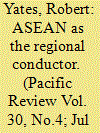

|
|
|
|
|
| Summary/Abstract |
This paper analyses ASEAN's prominence in regional order negotiation and management in Southeast Asia and the Asia-pacific through the lens of social role negotiation. It argues that ASEAN has negotiated legitimate social roles as the ‘primary manager’ in Southeast Asia and the ‘regional conductor’ of the Asia-Pacific order. It develops an English School-inspired role negotiation framework and applies it to three periods: 1954–1975 when ASEAN's ‘primary manager’ role emerged from negotiations with the USA; 1978–1991 when ASEAN's role was strengthened through negotiations with China during the Cambodian conflict; and 1991-present when ASEAN created and expanded the ‘regional conductor’ role. Negotiations during the Cold War established a division of labour where great powers provided security public goods but the great power function of diplomatic leadership was transferred to ASEAN. ASEAN's diplomatic leadership in Southeast Asia provided a foundation for creating its ‘regional conductor’ role after the Cold War. ASEAN's ability to sustain its roles depends on maintaining role bargains acceptable to the great powers, an increasingly difficult task due to great power rivalry in the South China Sea.
|
|
|
|
|
|
|
|
|
|
|
|
|
|
|
|
| 2 |
ID:
153240
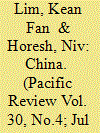

|
|
|
|
|
| Summary/Abstract |
The political-economic evolution of post-Mao China has been portrayed as a historically inevitable embrace of neoliberalism; as an exemplification of the East Asian developmental state and as an extension of Soviet New Economic Policy-style state capitalism. This paper evaluates these portrayals through a broad historical and geographical framework. It examines the position of China as a new state after 1949. It then places the shifting logics of socioeconomic regulation in China in relation to (1) the global neoliberal hegemony since the 1980s and (2) the concomitant shifts in the economic policies of Japan, South Korea and Taiwan. In so doing, the paper demonstrates how the Communist Party of China creatively adapted and re-purposed regulatory logics from the Washington Consensus and East Asian policies to consolidate its own version of Leninist state-led development.
|
|
|
|
|
|
|
|
|
|
|
|
|
|
|
|
| 3 |
ID:
153249


|
|
|
|
|
| Summary/Abstract |
While the Korea–United States (KORUS) free-trade agreement negotiations were concluded in 2007, and ratified in 2011, the agreement has remained deeply controversial. Labor unions, civil society groups, and opposition politicians in South Korea have criticized the agreement as being unfair, and also in the United States have voices spoken out against the agreement. The process of negotiation by South Korea was deeply flawed, and the conclusion of the agreement, that included a unilateral ratification by the ruling party in National Assembly, was forcefully opposed by many groups in South Korean society with violent demonstrations leading almost to the collapse of the Lee Myung-bak government. This article argues that it was not only the perception of potential economic damage to, in particular agricultural, domestic interest that was the main cause of the public resistance to the agreement, but that the unique nature of the relationship with the United States, and how this influenced the progress of negotiating and ratifying the agreement in South Korea, was a leading course of the divisiveness of the agreement and the massive resistance it faced. This is also why while the conservative Park Geun-hye government has expressed its willingness to re-negotiate other free-trade agreements, it has remained adamant in its refusal to even consider reopening the KORUS agreement. It is not only the apparent trade benefits that accrued to South Korea that is behind this refusal. With the ruling party having lost the April 2016 National Assembly elections and presidential elections scheduled for December 2017, the conservative elite, concerned about its electoral fate, has no interest in re-opening such a divisive issue as the KORUS free-trade agreement.
|
|
|
|
|
|
|
|
|
|
|
|
|
|
|
|
| 4 |
ID:
153248


|
|
|
|
|
| Summary/Abstract |
‘Non-traditional security’ (NTS) is prominently featured in the agenda of the Association of Southeast Asian Nations (ASEAN) and other ASEAN-led institutions in the Asia-Pacific. ‘NTS’ brings together a series transnational and non-military security threats that are considered common among regional states, urgent for them to attend to, and non-sensitive all at the same time. This a priori makes it a self-evident focus of attempts to bring regional security cooperation ‘to a higher plane’. However, this paper reveals that the uncontroversial character of NTS is overestimated, by shedding light on the co-existence of divergent – and potentially contradictory – interpretations of its meaning and implications in ASEAN and the wider region. In a context where ASEAN's relevance to the pursuit of regional security is increasingly being measured against its (in)ability to provide a coherent approach to security challenges that affect the region, the contested nature of NTS has important implications for the grouping's resilience in the twenty-first century.
|
|
|
|
|
|
|
|
|
|
|
|
|
|
|
|
| 5 |
ID:
153242


|
|
|
|
|
| Summary/Abstract |
The aim of this article is to interpret Tokyo's pivotal role in the Kyoto Protocol negotiations as a practice of reconstructing Japan's identity of an ‘international’ and ‘independent’ country. The text bases this argument in poststructural national identity scholarship, which believes that discursive differentiation to international forces (‘others’) plays a decisive role in formulating state's identity. For most parts of the post-war history, United States served as the most significant other for Japan's self construction. Japan narrated itself as a ‘weak’ and ‘subservient’ country dominated by the ‘dominant’ West. This narrative, however, has been significantly altered after the dissolution of the Soviet Union. Japan's identity entrepreneurs began describing Japan as an ‘independent’ or ‘normal’ country, one that proactively contributes to world affairs. Tokyo's legitimization of the Kyoto Protocol was in line with this identity reconstruction. The image of a proactive environmental leader created a symbol of Kyoto that overshadowed the opponents of the Protocol, and lead Japan to ratify it albeit the United States chose to withdraw from it. Once the ratification was over, however, the practical implementation failed to comply with Japan's symbolic commitment.
|
|
|
|
|
|
|
|
|
|
|
|
|
|
|
|
| 6 |
ID:
153244
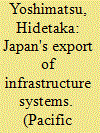

|
|
|
|
|
| Summary/Abstract |
This article focuses on the export of infrastructure systems as Japan's foreign economic policy that is unique in terms of diplomatic goals and means. It seeks to address how and why the Japanese government has strengthened commitments to expanding infrastructure exports to major Asian countries. This article argues that the Japanese government took advantage of developmental means of state-led initiative and institutionalised government-business collaboration in sustaining the export of infrastructure systems. It also contends that the Japanese government pursued, in the infrastructure export initiative, twin goals of creating a new growth engine to revitalise the Japanese economy and strengthening strategic links with Asian countries to balance China's regional influence.
|
|
|
|
|
|
|
|
|
|
|
|
|
|
|
|
| 7 |
ID:
153243
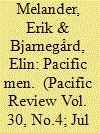

|
|
|
|
|
| Summary/Abstract |
The gender gap in attitudes to foreign policy is well established in public opinion literature. Studies have repeatedly reported that women tend to be more peaceful and less militaristic than men. This article reexamines attitudes of individuals in relation to foreign policy and pits the gender gap against the largely forgotten feminist gap. We argue that the individual-level relationship between gender equality attitudes on the one hand, and tolerance and benevolence on the other, is under-researched, but also that key contributions about the effects of feminism have been mostly ignored in research on the gender gap in public opinion. We return to the notion of a causal relationship between gender equality attitudes, and peaceful attitudes, and of a feminist gap that also exists among men. In a series of novel empirical tests, we demonstrate that attitudes to gender equality, not biological sex, explain attitudes towards other nationalities and religious groups. Using individual-level survey data from five countries around the Pacific: China, Indonesia, Japan, South Korea, and the United States of America, we show that both men and women who reject gender equality are much more hostile both to other nations and to minorities in their own country.
|
|
|
|
|
|
|
|
|
|
|
|
|
|
|
|
| 8 |
ID:
153250
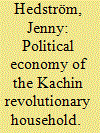

|
|
|
|
|
| Summary/Abstract |
Applying a feminist political economy analysis of the Kachin military movement, this article will be mapping women's involvement in the armed uprising since the outbreak of the conflict in 1961, demonstrating the centrality of gender relations for the war. Using primary data, this article will show how the household provides essential support to the Kachin war effort in the shape of emotional, physical and material labour, thus underscoring the critical role played by women in maintaining the conflict. Examining the relationship between narratives of gendered insecurity in the community and notions of militarized duty, this article will argue that the Kachin armed forces have employed gendered notions of security and duty to legitimize and sustain the conflict. The importance of normative gender relations for providing labour and emotional and material support for the conflict will then be examined, showing how the household is situated as the nucleus of the armed revolution. The findings in this article thus reveal a need to take into account the relationship between the household and the armed conflict, arguing that the household is a site inseparably linked to nationalistic objectives, underpinning the economic and ideological structures of military movements. Interventions aiming at resolving the conflict in Kachin must therefore consider the importance of gender relations in upholding the political-economy infrastructure of the military movement.
|
|
|
|
|
|
|
|
|
|
|
|
|
|
|
|
| 9 |
ID:
153245


|
|
|
|
|
| Summary/Abstract |
Maintaining global peace as China rises is a key strategic goal of Western liberal democracies. Compared to other western liberal democracies, New Zealand's response to the ‘rise of China’ is notable for its absence of security and political frictions and for the achievement of a series of diplomatic ‘firsts’. Can this be explained only by material concern over the national economic interest as China's role in the global economy increases or do ideational factors also underlay how New Zealand engages China? This paper employs the ontological security framework to demonstrate how New Zealand identity as a ‘small trading nation’ and ‘good international citizen’ has shaped its turn to Asia and response to the ‘rise of China'. It first analyses the origins of New Zealand's outward facing identity and resultant foreign policy positions long before China became an important aspect of New Zealand trade policy. It then shows how New Zealand seeks ontological security as a ‘small trading nation’ and ‘good international citizen’ in its relations with China and how China has responded to this type of engagement. The paper illustrates the importance of ideational factors in Western liberal democracies’ responses to the ‘rise of China’.
|
|
|
|
|
|
|
|
|
|
|
|
|
|
|
|
| 10 |
ID:
153251
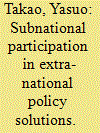

|
|
|
|
|
| Summary/Abstract |
The growing challenges of environment and sustainable development stretch across scales of geographic space and require action at multiple levels of jurisdictions, such as individual level, community level, national level, and global level. Multilevel governance and cross-scale coordination will open up opportunities for a variety of stakeholders to participate in decision-making. While potentially increasing the capacity of governance, the cross-scale and multilevel approaches may face a difficulty in policy coordination created by the plurality of stakeholders and be attended with organizational complexity. This article will examine the potential of subnational participation to make a policy choice, mediated by local governments, to be congruent with global strategies and national mandates in a consistent way. To this end, it will bring a new perspective to Kitakyushu City's experience in Japan as a heuristic test case study. My claim is that subnational actors occupy a strategic position to straddle the division between state and society, between the center and the periphery, and between the domestic and the foreign so they can act as an intermediate agent in reconnecting local action with national policy and turning global strategies into local action for problem solving.
|
|
|
|
|
|
|
|
|
|
|
|
|
|
|
|
| 11 |
ID:
153246


|
|
|
|
|
| Summary/Abstract |
In 2012, the Solomon Islands truth and reconciliation commission (TRC) submitted its Final Report to the Solomon Islands Government. The Report detailed the underlying and proximate causes of the conflict, provided a record of the injustices perpetrated during its course, and presented a set of recommendations designed both to address the underlying sources of tension in Solomon Islands society and to guard against future hostilities. In the time that has since elapsed, however, successive Solomon Islands Governments have failed to uphold their obligations to publish the report and implement its recommendations. This article examines the reasons for this implementation gap and considers its ingoing ramifications for transitional justice and reconciliation in the Solomon Islands. It argues that the implementation gap can be attributed to a fundamental lack of political will, provoked by the TRC's decision to ‘name names,’ combined with the extremely limited economic capacity of the state. What is more, it also demonstrates that the failure to implement key recommendations has meant that the underlying causes of the conflict remain without adequate redress and that the legitimacy of the TRC and the Solomon Islands’ broader reconciliation process has been brought into serious question.
|
|
|
|
|
|
|
|
|
|
|
|
|
|
|
|
|
|
|
|
|